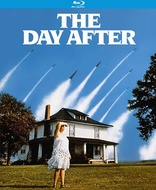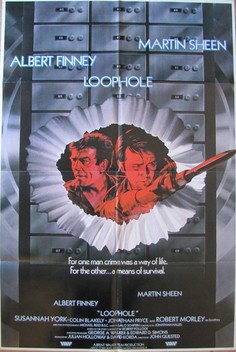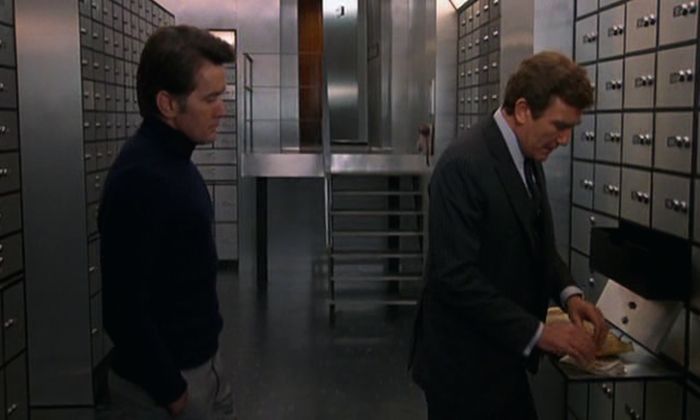Double-posting from the dedicated thread...

Residents of Kansas City, Missouri and the nearby college town of Lawrence, Kansas go about their everyday lives while news updates of escalating tensions in Germany between NATO and the Soviet Union air on televisions and radios with increasing frequency. A doctor in an upscale neighborhood prepares to travel to a college lecture while coming to terms with the fact that his adult daughter is moving away to Boston. Airmen stationed at a Lawrence missile silo joke about their weekend fishing plans. A farmer expresses good-natured concern for his daughter, who sneaks off into the night with her college student fiancé two days before their wedding. Media broadcasts announce that the Soviets have formed a West Berlin blockade and that a skirmish is imminent, but small-town Americans, KSU students, and metropolitan workers all have their own plans, their own dreams, and their own busy schedules. When apprehensions about the possibility of nuclear war surface, these citizens quell their nervousness by assuring themselves that rationality will ultimately win as it always has before.
When missiles are launched into the air, a bewildered populace watches in slack-jawed terror, instantly forgetting their sports events, their work commutes, and their farm duties. The missiles will reach Russia in 30 minutes, and, in turn, a Russian counterattack will reach the multiple strategic targets around Kansas City during the same time frame. A flash of light suddenly appears above Kansas City. Cityscapes are instantly vaporized. People are burned alive in microseconds. An electromagnetic pulse shuts down distant power grids. Survivors struggle to restore order in the aftermath, but the effects of radiation exposure, the chaos in the absence of authorities, and the realization that the broken pieces may never fit together again threaten to envelope them with a gradual sense of resignation.
The Day After, a made-for-television movie that aired on November 20, 1983, brought the horror of nuclear destruction into almost 40 million households around America, and is still revered today as an unprecedentedly groundbreaking pop culture phenomenon. I was in sixth grade during this initial television airing, and, much to my dismay, my parents wisely heeded the advance advisories that the graphic depictions in the film would be inappropriate for children and confined me to my bedroom, despite my protests. After trying in vain to peek around the corner of the living room and watch this movie from behind the shoulders of my parents, I was shooed back to my room, where I left the door cracked open so that I could listen with fascination to the dialogue, the explosions, and the panicked fray. In retrospect, the experience of listening to the audio of this film probably traumatized me more than I would have been had I actually been able to see it, because the images on the television screen were nowhere near as scary as the images formed in my 11 year-old brain.
I was particularly unsettled as I overheard one scene where a girl, who was overwhelmed with claustrophobia while staying in a cellar shelter with her farm family, ran up the stairs and out of the house, initially believing that it was a beautiful day outside, only to be informed by a male voice about the radiation.
“You can't see it... you can't feel it... and you can't taste it. But it's here, right now, all around us! It's goin' through you like an X-ray! Right into your cells!”
Director Nicholas Meyer, who had previously helmed the amazingly popular
Star Trek II: The Wrath of Khan, disregarded studio protests and plowed forward with his instinct to release a television film that would not pull punches with regard to disturbing content, because he was spurred by a civic responsibility to inform the public about the seriousness of the issue at hand during a time when the Cold War and the prospect of Mutual Assured Destruction ruled the day. His resolve was noted by none other than President Ronald Reagan, who, after watching the film a few nights before its airing, noted in his diaries,
“It’s very effective and left me greatly depressed.”
Meyer initially intended to cast the production with unknown actors, so that star power would not take the minds of the viewers out of the story, but pressure gave way to the inclusion of a few recognizable names. Jason Robards (
All the President's Men), JoBeth Williams (
Poltergeist), Steve Guttenberg (
Police Academy), John Cullum (
1776), John Lithgow (
The World According to Garp), and even Stephen Furst, who played “Flounder” in
National Lampoon's Animal House, are all featured in roles of uncanny seriousness, but even their presences are drowned out by the sight of hundreds of background extras in shaved heads, bald caps, and gory makeup to illustrate the realities of radiation sickness.
Although
The Day After pales in comparison to the bleaker documentary-style approach of the BBC television film,
Threads, which was released the following year and introduced the masses to the concept of a nuclear winter, it still rises above its conventional storytelling setup to strike fear in our hearts. When I finally saw it during a syndicated airing a couple of years after its initial showing, after my experience of seeing
Threads during its first presentation on our shores, I realized that the frightful hype was well-earned. I now own this film on Blu-ray, and I can watch it whenever I want
(Take that, Mom and Dad.), but I am still reduced to a state of unease, despite the dated special effects. The moment that still resonates today with uncanny power is the scene where people at a crowded sports stadium watch with shock as missiles fire from the silos on the outskirts of the town. It's really happening. There's no turning back. The missiles have been launched. A nuclear war has actually started.
Now, over 30 years after its release, I would like to think that the scenarios outlined in
The Day After are no longer possible, and that the world has moved past the point where nuclear war is considered to be an option. As one character in the film sadly observes, however, stupidity has a habit of getting its way.
Kino Lorber, God bless 'em, have given us both the U.S. Television Cut, which sports the best picture quality and remains the most impactful version of the story, and the slightly longer Theatrical Cut, which differs only marginally in terms of content. My advice to all of you is to watch the Television Cut for the picture quality and the resonance, but then watch the Theatrical Cut for the excellent commentary track. A director interview and a JoBeth Williams interview are icing on this radioactive cake.


































 ).
).
 Linear Mode
Linear Mode

